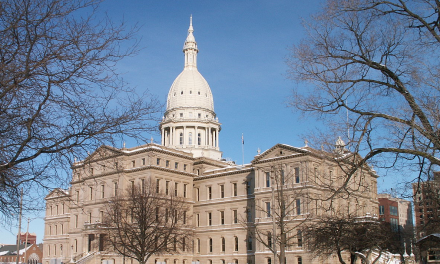What started 25 years ago as a single initiative — a single youth competition — to strengthen African American and Latinx representation in classical music has now become a globally-recognized organization and movement to bring more diversity into the classical music industry. Detroit’s Sphinx Organization celebrates 25 years of diversity in classical music this year.
RELATED: 25th Annual Sphinx Competition Winner Kebra Seyoun Charles Performs
In celebration of the quarter-century milestone, WRCJ 90.9FM Producer and host Celilia Sharpe sits down with Sphinx Organization’s President and Artistic Director Afa Dworkin to talk about the organization’s growth, which now includes four touring orchestras, a global audience of two-million people as well as multiple initiatives for children through adulthood. Plus, the duo discusses the organization’s partnership with Detroit Public Television* and what’s next for the organization, including a 25th-anniversary celebration, concerts at the University Musical Society and more.
*Detroit Public Television, One Detroit’s parent broadcast, has an ongoing partnership with the Sphinx Organization to promote its annual competitions and winners.
Full Transcript:
Cecelia Sharpe Producer/Host, WRCJ 90.9 FM: Ladies and gentlemen, my guest for today is Afa Dworkin, the president and artistic director of the Sphinx Organization. Welcome to the show.
Afa Dworkin, President & Artistic Director, Sphinx Organization: Thank you so much. Great to be here, Cecelia.
Cecelia Sharpe: Can you talk about where Sphinx started and the journey of growth to where you are now?
Afa Dworkin: Sphinx was launched by Aaron Dworkin, its founder more than 25 years ago now as a single initiative, the Sphinx competition for young, black and Latino string players. And really, the ethos behind Sphinx competition was to identify, to nurture and shed a spotlight upon the highest level, excelling, poised black and Latino string musicians who were talented and certainly were pursuing a career and a pathway in classical music, but perhaps needed a bit more access and that opportunity to build a network. The idea was that if we competitively select these young artists, they will form a network.
And then when given the opportunity, they will truly shine, therefore, and thereby nurturing the entire network, the pipeline of classical music, which we knew lacked diversity. So what started as a singular initiative now has become really a movement, for not just diversity, but truly new standards of excellence in classical music, both off and on stage.
Not just in terms of the Sphinx competition, but now there is programing spanning four separate areas ranging from creative youth development in that early introduction to classical music to artists development and nurturing, and to performing ensembles so early professional musicians, we now have four touring ensembles and then onward to arts, leadership and entrepreneurship, which has really become an important part of Sphinx’s work. Annually, we reach now more than 50,000 people and more than two million in audiences. So it’s become not just a movement, but really a community within classical music that’s trying to perpetuate the systemic change.
Cecelia Sharpe: Afa, the Sphinx organization under your leadership and of course, under Aaron’s leadership in the past, you guys are dynamic visionaries and always coming up with new and innovative ways to present and reach your audiences. Talk about your partnership with Detroit Public Television. What does that mean to you?
Afa Dworkin: I think in many ways, what DPTV does for us and really for the careers of these young musicians is immeasurably important. It’s the opportunity for millions across the world to not just see the livestream, but also the later broadcast. It’s the opportunity to both endorse these musicians and really showcase the talent not only for our immediate home community right here in Detroit, but also to really spread the word far and wide.
And the impact of that, in turn, is such that then these young artists receive those opportunities to perform with orchestras and on recital stages across the country. And I think the piece that’s not to be forgotten or underestimated is the power of a parent such as myself or really anyone across the country of seeing this talent and saying my kid can do this. I can encourage my child to pick up the cello or the violin and viola. I can really nurture this talent, and I can see a viable career path for the young people in my life.
Cecelia Sharpe: What’s next for the Sphinx organization?
Afa Dworkin: Ultimately, we get to now celebrate the 25th anniversary for the next season, which will culminate with performances at Carnegie Hall in the fall, as well as right here at University Musical Society next January and then onwards to Kennedy Center, where both the Sphinx Symphony Orchestra, as well as our exigence choral ensemble, will give their performances of incredible works by black and brown composers, culminating that celebration.
And of course, on a big, holistic level, what we look forward to is really continuing to shape Sphinx in the manner where it serves our community, where it serves our artists and where it serves the field. Sphinx has become this resource organization not just through funding and scholarship programs, but through development of best practices, through defining new standards, through nurturing careers, through helping our partners all across the world, really not just the country to shape their own strategy surrounding diversity, equity and inclusion. We have to showcase the talent in such a manner where one day what we see on stage reflects what we have in our communities, which is that vibrancy and that diversity and really representation of all of the voices.
Cecelia Sharpe: Afa, thank you so much for taking time out of your incredibly busy day to talk with me.
Afa Dworkin: Thank you so much. It’s great to be here and thank you for shedding light on Sphinx’s work and the mission.
Subscribe to One Detroit’s YouTube Channel & Don’t miss One Detroit Mondays and Thursdays at 7:30 p.m. on Detroit Public TV, WTVS-Channel 56.
Catch the daily conversations on our website, Facebook, Twitter @DPTVOneDetroit, and Instagram @One.Detroit
View Past Episodes >
Watch One Detroit every Monday and Thursday at 7:30 p.m. ET on Detroit Public TV on Detroit Public TV, WTVS-Channel 56.




